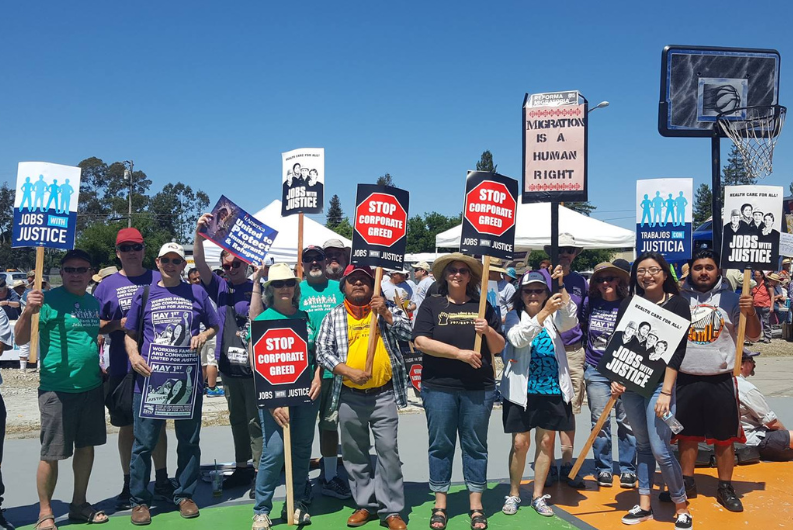On April 9 in Los Angeles, workers along the Walmart supply chain joined forces to launch the Walmart Supply Chain Organizing Committee. The public briefing announced worker-centered solutions for deteriorating conditions along Walmart’s supply chain. After all, they are the ones who have to deal with low standards on a daily basis.
Walmart, the US-based retailer, is only a partial picture of the tentacles this company has ravaging the globe. What has set this company far ahead from all of its competitors is its centralized control over US and international suppliers and distributors. While many of these suppliers can rise or fall at the whims of Walmart, the company consistently fails to improve them.
For those needing proof, consider the following from the statement released:
- In January, after many statements in the press about a beefed up domestic monitoring program, the state of California ordered a Southern California warehouse that processes merchandise for Walmart and other retailers to pay 865 workers more than $1 million in stolen wages. The California Division of Labor Standards Enforcement issued the citations against Quetico, LLC, a large warehouse complex in Chino, California for missing pay for time worked, missed lunch periods, warehouse time clocks were faulty, workers pay stubs had been adjusted by the company reducing their pay and workers said that if they complained managers would issue a warning and restore their pay. After three warnings workers are fired.
- In June 2012, H-2B guestworkers exposed forced labor at a Walmart seafood supplier in Louisiana called C.J.’s Seafood. The guestworkers faced brutal conditions including threats deportation and even violence against themselves and their families to suppress complaints. When the workers exposed the forced labor, Walmart dispatched “third-party” auditor, then claimed it had found no evidence of abuse and attempted to mislead the press about the status of federal investigations. Only after massive public outcry did Walmart end its contract with the supplier.
- In fall 2012, workers at Walmart-contracted warehouses in Southern California and Chicago held a series of strikes to protest retaliation they experienced when speaking out against unsafe working conditions including extreme temperatures, broken equipment and lack of access to drinking water. Walmart repeatedly denied the allegations in the press. The National Labor Relations Board is investigating federal charges, the California Division of Occupational Safety and Health cited the company for numerous health and safety violations in December.
- In November 2012, a horrific fire ripped through a Bangladesh factory that produced clothing for Walmart, killing 112 workers. The New York Times reported that Walmart had played the lead role in blocking increased fire safety protections at Bangladeshi garment factories the year before, claiming the cost would be too high. (Apparently the lives of 112 workers was more cost-effective.)
- As a result of employee lawsuits in U.S. District Court about minimum wage violations, missing pay for time worked, unpaid overtime and other issues, contractors at a Walmart-owned warehouse in Elwood, Illinois were compelled to pay back more than $700,000 in wages stolen during 2012 alone. Although workers at the warehouse filed a formal ethics complaint with Walmart in February 2012 under the company’s Standards for Suppliers policy, incidents of wage theft, gender discrimination, health and safety violations and illegal retaliation have continued. In September 2012 several workers were fired after they raised issues of ongoing wage theft and safety risks to the contractors and to Walmart. In response, workers waged a three-week strike. Recently the National Labor Relations Board found merit to worker charges of unlawful retaliation related to these incidents.
Today, Walmart issued yet another “non-solution” to the poor conditions along their supply chain—offering training to Bangladeshi suppliers—again while blocking increased fire safety protections in Bangladeshi garment factories due to cost.
Walmart has shown a willingness to accept responsibility for conditions throughout its supply chain, but as these cases and others show, Walmart is unwilling to uphold basic labor standards on its supply chain—either those of federal labor law or the company’s own Standards for Suppliers.
In response, workers from Walmart’s supply chain in the US have united around a common solution:
Walmart must work with workers in each facet of its supply chain to ensure dignity and safety.
Walmart must act to make a sincere commitment to not only take responsibility for its supply chain, but to also work with stakeholder groups to ensure and protect the basic rights and safety of the workers who labor to produce and transport the merchandise that arrives on its shelves every day.
The Warehouse Workers United, the National Guestworkers Alliance, the Warehouse Workers for Justice, New Labor, Jobs with Justice, Change to Win, and the National Supply Chain Commission joined forces to create the Walmart Supply Chain Organizing Committee in the United States—supporting the right to organize for all supply chain workers. Workers from Bangladesh’s garment industry will join US workers for the launch while they are on a US tour following the tragic December fire.
Because multiple industries make up the Walmart supply chain, different protections are required to ensure workers in each link are protected, standards are enforced, and that workers have a voice in the process.
Thus, the committee insists the company address the following:
- Garment workers in Bangladesh are demanding Walmart enter into a fire safety agreement so that not one more worker dies to produce profits for Walmart and other global brands. They are also demanding that Walmart compensate the victims who died making their clothes.
- Guestworkers in the seafood processing industry are demanding an agreement that would end forced labor in the supply chain, including protections from immigration-based retaliation and guarantees of the right to organize.
- Workers in Walmart-contracted warehouses are responding to Walmart’s Standards for Suppliers by calling for additional protections that are enforceable, credible and involve workers in a meaningful way.
Workers are also standing in solidarity with Walmart associates from hundreds of stores, in almost all 50 states, who have come together as part of the Organization United for Respect at Walmart (OUR Walmart) in order to improve their lives with compensation that supports their families and to be treated with respect on the job.
They call on all consumers, community members and people of conscience to support supply chain workers in their fight for dignity Walmart so that each worker can truly enjoy what Walmart touts as their own standards for suppliers: decent wages, protection under the law, and the right to form a union and collectively bargain.






